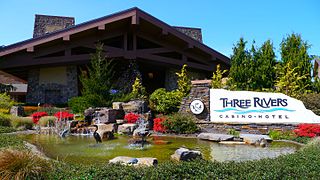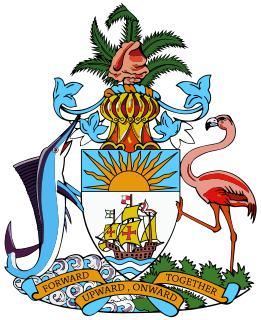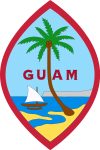A referendum is a direct and universal vote in which an entire electorate is invited to vote on a particular proposal and can have nationwide or local forms. This may result in the adoption of a new policy or specific law. In some countries, it is synonymous with a plebiscite or a vote on a ballot question.
General elections were held in Guam on November 2, 2004 in order to elect all 15 members of the legislature, the federal delegate, mayors of 14 cities, vice mayors of three cities, the public auditor, the Consolidated Commission on Utilities, two judges of the Superior Court, running for retention and the Guam Public Education Policy Board. Voters also voted on the President of the United States although the territory sent no representatives to the electoral college. There was also a referendum on allowing gambling, which was rejected by voters.

Referendums in Australia are polls held in Australia to approve parliament-proposed changes to the Constitution of Australia or to the constitutions of states and territories. Polls conducted on non-constitutional issues are usually referred to as plebiscites.

A racino is a combined race track and casino. In some cases, the gambling is limited to slot machines, but many locations are beginning to include table games such as blackjack, poker, and roulette.

General elections were held in Guam on November 7, 2006 in order to elect the Governor, all 15 seats in the Legislature and the federal delegate. There was also a double referendum on legalise slot machines at racing tracks and raising the age at which citizens could purchase and consume alcohol to 21.
Most forms of gambling in Japan are generally banned by the Criminal Code chapter 23; however, there are several exceptions, including betting on horse racing and certain motor sports.

Gambling in Oregon relates to the laws, regulations, and authorized forms of gambling.
Gambling in Pennsylvania includes casino gambling, the Pennsylvania Lottery, horse racing, Bingo, and small games of chance conducted by nonprofit organizations and taverns under limited circumstances. Although casinos gaming has only been legal for about a decade, Pennsylvania is second only to Nevada in commercial casino revenues.

A referendum on legalising casino establishments was held in Palau on 22 June 2011. The proposal was rejected by 75.5% of voters.
Twelve national referendums were held in Switzerland during 2012. On 11 March voters across the country were asked five questions on employment leave, second houses, building society savings, the Fixed Book Price Agreement and gambling revenues. On 17 June there were three questions on healthcare, foreign policy and home buying. On 23 September there were three on a smoking ban, secure housing in old age and music lessons at school. A final referendum was held on 25 November on the Animal Diseases Act.

An unofficial referendum on integration of Northern Marianas with Guam was held in Saipan in June 1958. Though the proposal was approved by nearly 64% of voters and the Guam Legislature adopted Resolution No. 367 requesting the US Congress to integrate the governments, the United States did not integrate the islands.
A referendum on legalising slot machines at greyhound racetracks was held in Guam on 5 January 2008. The proposal was rejected by 63% of voters.

A referendum on allowing casino gambling was held in the United States Virgin Islands on 3 November 1992. The result was binding only if a majority of registered voters participated. The proposal was rejected by a narrow margin, but was later approved in a 1994 referendum.

A referendum on legalising web shops and establishing a national lottery was held in the Bahamas on 28 January 2013. Both proposals were rejected by voters.
Eleven national referendums were held in Switzerland during 2013. Voters approved six proposals related to spatial planning, executive pay, family policy, amendments to the laws on asylum and epidemics and an increase in the length of petrol station shop opening hours. The other five proposals on directly electing the Federal Council, abolishing compulsory military service, limiting salaries in a company to 12 times the lowest paid worker, tax credits for stay-at-home parents and an increase in road tax were rejected.

Gambling in Taiwan is prohibited by the Criminal Code of the Republic of China. State-run lotteries, like the Uniform Invoice lottery, are the only legal form of gambling on mainland Taiwan. The construction of casinos on some off-shore islands was legalized in 2009, though to date none have been built. Some gambling-style games are allowed either on special days or under special restricted circumstances.

A referendum on legalising casino gambling was held in the United States Virgin Islands in November 1994, alongside general elections. It was a repeat of the 1992 referendum, which saw the proposal rejected by a narrow margin. This time the proposal was rejected in St Thomas and St John but approved in St Croix.

Maine Question 1, formally An Act To Allow Slot Machines or a Casino in York County, was a citizen-initiated referendum question that appeared on the November 7, 2017, statewide ballot in Maine. It sought to award a license for the construction and operation of a casino in York County, Maine by a qualified entity as spelled out in the proposed law, with tax revenue generated by the casino to go to specific programs. The wording of the proposed law effectively permitted only one company, Capital 7, to be awarded the license. The ballot measure was defeated, with 83% of voters opposing it.
Ten national referendums were held in Switzerland in 2018. Polling took place on 4 March, 10 June, 23 September and 25 November.










